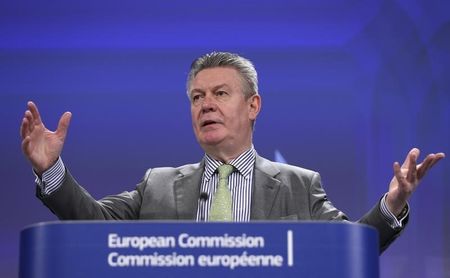BRUSSELS (Reuters) - The European Union has concluded talks on a free trade deal with Singapore by adding investor protection clauses, which critics like Germany say give multinationals too much power.
The European Commission said on Friday that the investment accord concluded negotiations of the EU-Singapore Free Trade Agreement (EUSFTA), other parts of which were settled in 2013. It now will need to be approved by EU member states and the European Parliament.
The investment protection chapter will ensure a stable and fair regime for foreign investors while preserving the right of parties to regulate in the public interest, the Commission said.
EU Trade Commissioner Karel De Gucht told a news conference the deal included an investor-state dispute settlement (ISDS) provision, which allows companies to take cross-border legal action against governments.
But critics say by enabling multinationals to file complaints to a special tribunal, ISDS risks undermining laws on labour, the environment or food standards.
German Economy Minister Sigmar Gabriel said last month that Germany rejected investment protection agreements and that it would not sign a trade pact concluded with Canada unless they were removed. It has also objected to investment protection in a planned free trade deal with the United States.
It is not clear what Germany's stance is on the Singapore ISDS.
"I believe this is a very modern template of an ISDS, very similar to the one with Canada," De Gucht said on Friday.
De Gucht has said Germany is operating a double standard, having invented foreign investment protection in the 1950s and concluded ISDS deals with 14 other EU members, notably in the east of the bloc.
"We are not doing anything weird," De Gucht told a news conference on Friday. "We are doing our job on the basis of mandates given to us."
He said that going back on agreements already reached would be "a disaster", adding 24 of 28 member states had said that ISDS should be part of investment agreements, including with the United States.
The EU-Singapore deal is the European Union's first with a southeast Asian economy and is seen as a stepping stone to similar deals with Malaysia, Thailand and Vietnam.

The European Union is the largest contributor of foreign direct investment in Singapore, and Singapore is the second largest Asian investor in the EU.
(Reporting by Philip Blenkinsop; Editing by Larry King)
_800x533_L_1412520412.jpg)